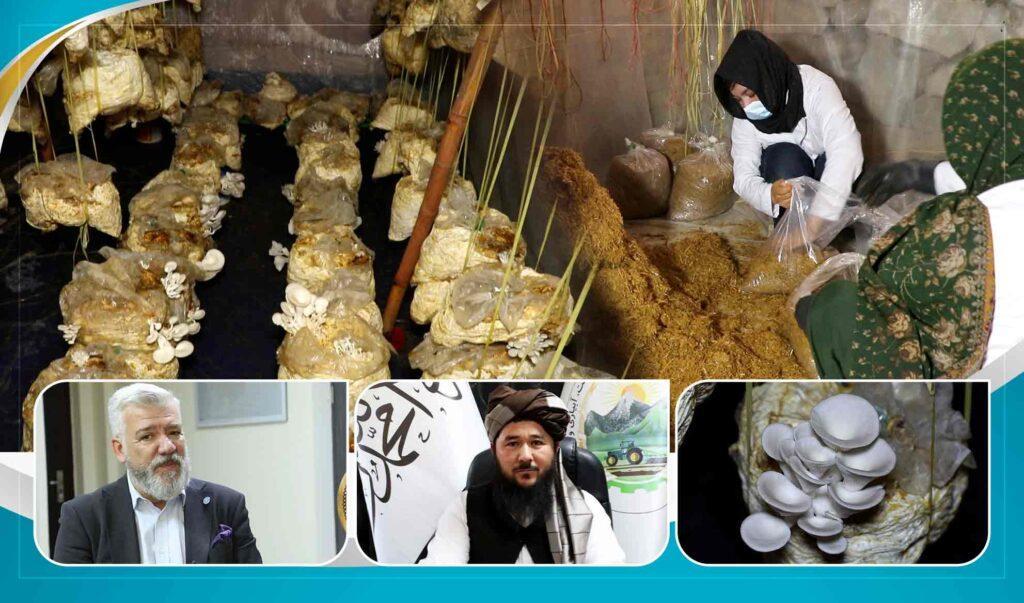
Women Mushroom Farmers In Kabul Seek Cold Storages
KABUL (Pajhwok): A number of women in Kabul, working with diligent hands and hopeful hearts to cultivate mushrooms using straw, lime and bran, say they need cold storage facilities to expand their businesses.
Around three years ago, 25 women from the Charasiab and Darulaman areas of Kabul were trained in mushroom cultivation with financial support from the United Nations Food and Agriculture Organisation (FAO).
Today, each of these women is engaged in mushroom farming at home and playing an important role in supporting their families' income.
Breshna Taheri, a resident of Darulaman and founder of the“Sadafi” mushroom farm, told Pajhwok Afghan News that before establishing the farm and learning mushroom cultivation, her family's economic situation was poor as her husband was unemployed.
With her husband's support, she now grows mushrooms in the basement of their home in Charasiab.
She said the harvested mushrooms were packaged and taken to a cold storage facility they built by themselves in Darulaman, from where they were sold to shopkeepers in Kabul.
Taheri explained that she learnt mushroom cultivation through a three-month FAO training programme, during which participants also received raw materials.
“In that programme, we were taught the proper and technical process of mushroom cultivation- from preparing the raw materials and growing the mushrooms to harvesting them,” she said.
She is satisfied with her business, noting that she and other women trained in mushroom cultivation earn up to 18,000 afghanis a month from this work. According to her, the price of each kilogram of mushrooms produced on her farm was 350 afghanis in Kabul markets.
Another mushroom grower, Samia Jabari, said:“Mushrooms are cultivated in a completely clean, disinfected and contamination-free environment.”
She explained that the straw used in mushroom farms was first washed and then boiled at a specific temperature. The boiled straw was placed in disinfected plastic bags and mixed with lime and bran, which provide nutrients for growth. The mushrooms grow inside these bags within about 40 days, after which they are harvested, packaged and made ready for sale.
She urged people to support domestic production, adding:“We women produce clean mushrooms free from germs and supply them to the market. Most of our products are sold in Kabul.”
Jabari also called on national and international institutions to expand mushroom cultivation programmes for women, saying:“Mushroom farming is a good source of income for women who are unemployed and face economic hardship.”
Similarly, Saheba Sadat, another mushroom grower, said she was delighted to have participated in a mushroom cultivation programme and now plays a positive role in her family's economy.
She also urged for greater support for women mushroom growers.
“The lack of cold storages is one of our main challenges. If this problem is resolved, our production and sales will expand and we may even begin exports,” she said.
She added that currently one kilogram of dried mushrooms, used for medicinal purposes, is sold for 500 afghanis in the market.
According to her, dried mushrooms are also exported abroad, particularly to India.
Experts: Expand sustainable programmes to empower Afghan women
Women's rights activist Lamia Shirzai praised the work of these women in mushroom cultivation and said such programmes should be expanded.
Highlighting the economic challenges faced by families, she called for comprehensive and sustainable programmes from national and international institutions to empower Afghan women.
At the same time, economic expert Isa Mubarez said:“Any initiative that creates employment opportunities for women is a positive step towards Afghanistan's economic self-sufficiency.”
He stressed that establishing small-scale farms for women in agriculture and livestock could strengthen household incomes and contribute to national economic growth.
“Afghan women already have valuable experience in agriculture, and if employment opportunities are provided, they can become a strong pillar of the country's economy,” he added.
Officials: Striving to address farmers' problems and promote agriculture
Maulvi Sher Mohammad Hatimi, spokesman for the Ministry of Agriculture, Irrigation and Livestock (MoAIL), said that between 70 and 75 percent of Afghans were engaged in farming and livestock, and women actively contribute alongside men both in Kabul and the provinces.
Referring to the work of mushroom growers, he said:“Women play a significant role in mushroom cultivation, household gardening and other agricultural activities.”
Hatimi said the ministry, in cooperation with national and international institutions, has provided specialised training and facilities for women with the aim of boosting their economic growth and supporting their families.
He noted that the ministry is currently working with organisations such as FAO and the World Food Programme (WFP) to address farmers' challenges and promote agricultural development.
Richard Trenchard, FAO's representative in Afghanistan, told Pajhwok Afghan News that the organisation was supporting vulnerable families, especially women-headed households, through assistance packages aimed at improving nutrition and agricultural production.
“Our focus is on creating sustainable opportunities and empowering local communities so that they can be more resilient against economic and climate-related challenges,” he said.
According to him, in recent years FAO has implemented projects in crop production, livestock, distribution of improved seeds and animal vaccination.
kk/ma

Legal Disclaimer:
MENAFN provides the
information “as is” without warranty of any kind. We do not accept
any responsibility or liability for the accuracy, content, images,
videos, licenses, completeness, legality, or reliability of the information
contained in this article. If you have any complaints or copyright
issues related to this article, kindly contact the provider above.

















Comments
No comment